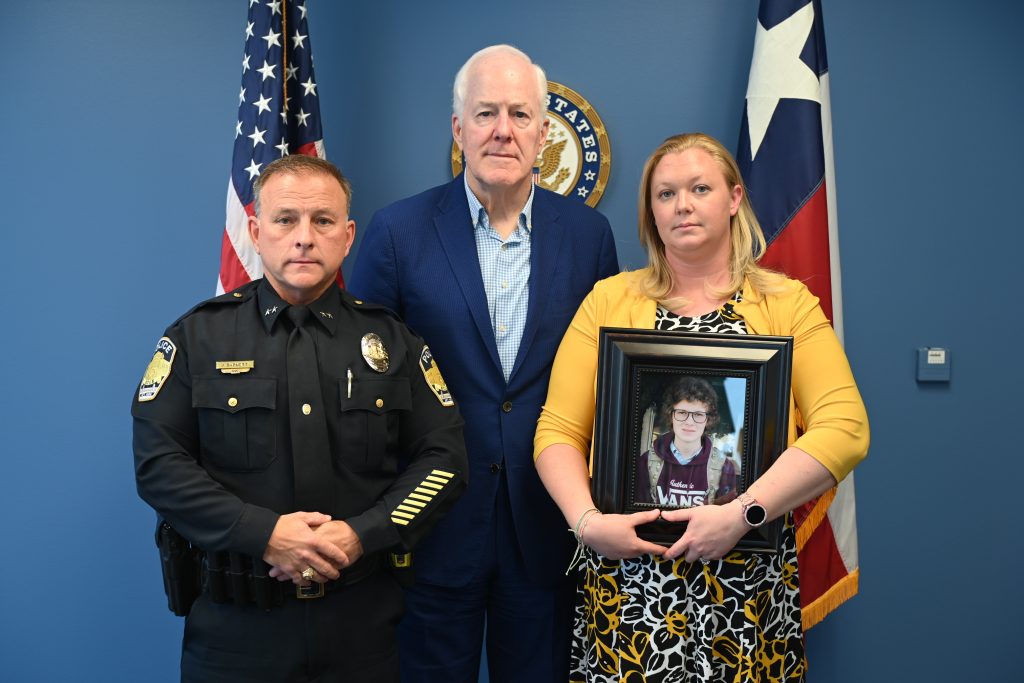PHOTO: Cornyn Meets with Mother of Fentanyl Poisoning Victim and Officials from Hays County
AUSTIN – U.S. Senator John Cornyn (R-TX) met today with Shannon McConville of Hays County who tragically lost her 17-year-old son, Kevin McConville, in August from fentanyl poisoning just a few weeks before the start of his senior year at Lehman High School. They were joined in the meeting by Kyle Police Chief Jeff Barnett and Hays CISD Chief Communications Officer Tim Savoy to discuss how the community is responding to the growing threat of the fentanyl crisis. See photo below.

This image is in the public domain, but those wishing to do so may credit the Office of U.S. Senator John Cornyn.
Background:
In Congress, Sen. Cornyn has championed policies to support substance use disorder treatment programs as well as equip law enforcement with the appropriate training and resources to combat the opioid crisis. The numerous pieces of legislation Sen. Cornyn has introduced and had signed into law have bolstered collaboration between federal, state, and local leaders.
This targeted legislation includes:
- Bipartisan Safer Communities Act (Signed into law on June 25, 2022)
- Expands the Certified Community Behavioral Health Center program to become nationwide, which will provide critical funding to help folks—including youth—with addiction and underlying mental health issues.
- Provides $750 million in funding to support crisis intervention programs to promote drug treatment and recovery services.
- Provides $240 million for SAMHSA’s Project AWARE, which increases awareness of mental health issues among school-aged youth and substance use disorders, provides training for school personnel and other adults who interact with school-aged youth to detect and respond to mental health issues, and connects school-aged youth who may have behavioral health issues and their families to needed services.
- Residential Substance Use Disorder Treatment Act (Passed the U.S. Senate unanimously in July 2021)
- Reauthorizes grants for residential substance use disorder treatment programs at state and local correctional and detention facilities, as well as community-care facilities through Fiscal Year 2026.
- Aims to break the cycle of substance use disorder for individuals in state, local, and tribal correctional facilities.
- Project Safe Neighborhood Grant Program Authorization Act (Introduced by Sen. Cornyn in September 2022)
- Improves communities’ ability to respond to opioid overdoses by promoting the hiring and training of law enforcement officials and data analysts to swiftly investigate and identify drug dealers connected to overdoses.
- Reauthorizes the Project Safe Neighborhoods Program, a nationwide law enforcement program focusing on the reduction of violent crime, for Fiscal Years 2023-2026 at $50 million.
- Provides state and federal resources in a collaborative effort to investigate and prosecute drug dealers, violent criminals, and street gangs
- Strengthens evidence-based and data-driven intervention and prevention initiatives, including juvenile justice projects, street-level outreach, conflict mediation, the provision of treatment and social services, and improving community anti-violence norms.
- Funds drug task forces.
- Justice and Mental Health Collaboration Reauthorization Act (Passed the U.S. Senate unanimously in June 2022)
- Enhances community capacity and linkage to care systems to ensure continuity of care and connection to mental health and substance use disorder crisis services.
- Supports programs that offer specialized training for public safety officers and mental health providers responding to those individuals in crisis or experiencing a relapse.
- Funds drug treatment courts and crisis intervention programs.
- Protecting America from Narcotics and Illicit Chemicals (PANIC) Act (Introduced by Sen. Cornyn in May 2022)
- Amends existing anti-narcotics trafficking laws to include countries, like China, that are known to export precursor chemicals used in illicit supply chains as major illicit drug producing countries.